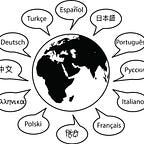Learn Phrases, Not Words: How to Supercharge Language Learning
The whole is greater than the sum of its parts
When you first start learning a language, you HAVE TO start with a few basic words: man, woman, dog, cat, I, you. Throw in a few basic verbs: walk, run, swim, fly. But as soon as possible, and especially after learning some verbs, it is important to begin thinking of words in terms of context and usage. In other words, start learning phrases and sentences (even if they’re very short). If you don’t, all you know is a growing list of isolated vocabulary words — and you still don’t know how to speak the language in any meaningful way. This means, even if you can count and prove you know 2000 words, you may not comprehend language in a substantial way that helps you be able to produce or have any output. This is why some people can have studied a language “for years” and still be terrified to sustain a basic conversation.
It’s natural to gravitate towards nouns and adjectives/adverbs because they are easy to understand. They also don’t change form in any significant way that is intimidating. Verbs, on the other hand, can be overwhelming for people. If the home language is structured in a way where verb conjugation is relatively simple or minimal, then a destination language with many rules around verb conjugation can seem impossible to master.
